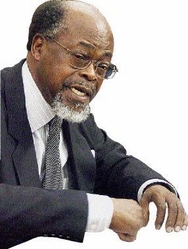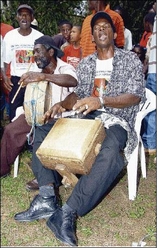Witter urges Maroons to enter rights charter debate
Published: Thursday | October 22, 2009

Witter
UNDER A makeshift tent, propped up by bamboo, patrons and residents of Moore Town listened intently to Public Defender Earl Witter as he addressed issues relating to the Maroon communities in Jamaica on Monday, October 16.
Witter was the keynote speaker at the Nanny Day celebrations in Moore Town, Portland, on Heroes Day.
No surrender
Standing in front of Nanny's Monument, Witter paid tribute to the "indomitable will" of the Maroons, a people who did not relinquish their freedom at anytime. "Freedom was maintained by and through battle and without surrender ... and it is this freedom that we celebrate today," he declared.
This utterance was in response to the view in some quarters that the Maroons, by virtue of signing peace treaties, had submitted themselves to the whim and fancy of the British. He said there had been attempts by some historians to "distort the records" to say that the Maroons had surrendered. However, "the Maroons could not be conquered, or be made to submit to the will and dictate of the English invaders or settlers ... ."
The onus then is on the shoulders of the Ma-roons to make sure that this notion is vanquished. A rewriting of the history books was implied as the public defender said, "In the months and years ahead, the Maroon communities will have to be entering into important dialogues with the sovereign authority of independent Jamaica".
As it concerns the December 2008 fatal market truck accident in Portland's Rio Grande valley, Witter said his office had initiated an investigation into the incident, but no conclusion had yet been drawn; moreover the matter was before the court. As such, no findings are available for announcement at this time.
Proactive maroons needed
His office got involved in the matter, he said, because "it may be that it is on account of the conditions of the roadway at Dam Bridge that this great tragedy was caused" and "it is the business of the public defender to protect and enforce the constitutional rights of the citizens of Jamaica". Yet, he has also suggested that the Maroons themselves will have to be proactive in guarding their own constitutional rights.
Though the Maroons in Jamaica have some amount of autonomy, as it relates to the lands on which they live and governing their own communities, inclusivity was encouraged by the public defender. He bemoaned the fact that the Maroons were never included in the discussions when the current Jamaican Constitution was drafted and now, were not invited to have a say in the discussion on the Charter of Rights before Parliament.
He implored the leaders of the Maroon communities to make their presence felt in Parliament and said the time was now.
"The advice I give to you today, on behalf of the office of the public defendant ... is that before the Charter of Rights be enshrined in the Constitution, the Maroon com-munities must let their voices be heard in the debate because if you remain silent at this time, and no account is taken of these rights and obligations, then the Maroon question will remain unresolved and unsettled," Witter said.
"When that debate is over, my hope, desire, and prayer is ... that the day will come when the Maroons and all other divergent communities in Jamaica will be embraced as one, under one flag, under the God we serve ... and that we go forward to the world as a united people."
The Charter of Rights, Witter said, should "delineate" the relationship between the government and the people and the people and the government.
paul.williams@gleanerjm.com

Members of the Accompong Maroons play their drums during a cultural presentation. - FILE







